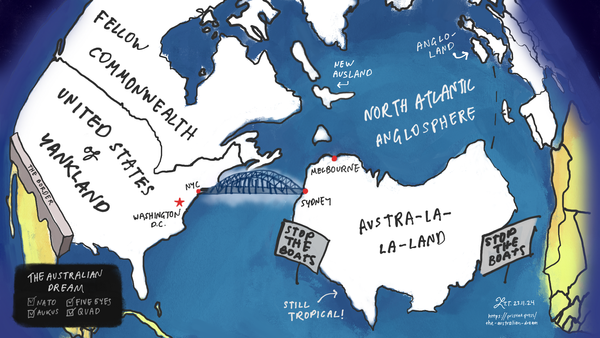I fear what the capitalists will do
In a monetary economy, capitalism is an unbeatable strategy, if not THE unbeatable strategy.

Journalist Vijay Prashad said in a podcast interview on the Green Dreamer that the capitalist would prefer that people work for 24 hours a day.
If you go back and read Karl Marx's book, Capital, particularly the chapter on the working day, it's very instructive. What Marx argues is that capital ordinarily would like to hire the worker for a 24 hour period. There is no limit as far as capital is concerned to how they want to hire people. After all, it was under the rule of capital that they did do that. They hired people and enslaved them and made them work unbelievably long hours.
Well, the problem is, if you hire somebody and make them work for 24 hours, they'll die in two days or three days. They won't survive. So there's a human limit to how many hours you can work. But still capital fights with us to basically take as much labor as possible […].
I feel that he did not go far enough. The capitalist, for example, would also prefer that people work for no pay. The United States — a country among many that have never truly matured from their original sins, including invasion, occupation and slavery — has the world’s largest incarcerated population. The United States makes up 4% of the world’s population and has 20% of the world’s incarcerated population. Some of these prisoners work for billionaires for 40 hours a week on less than a dollar a day. They’ve been taken away from their families — as a prominent former US police officer, who runs a whistleblowing website for police, said in this documentary, the police can arrest you for any reason in America. So has anything deep really changed at all on the question of slavery in the United States? Loss of freedom, forced labour for basically zero pay. That is another preferred state of capital.
Aside from getting people to work for as long as possible with as little money as you can possibly get away with, in order to make the most money as possible for yourself, capital employs this with just about every other sort of resource it can get its hands on. So for as long as we focus only on answers targeting the problems generated from capitalism, rather than capitalism itself — like getting wage increases while profits inevitably skyrocket, or abolishing one legal definition of slavery only for another form to manifest; and everything else from the powerful anti-colonial movements, anti-war dissidence to the serious environmental resistance — we’re never going to get out of this. And I’m afraid of where capitalism will take us before we can escape it.
So what is capitalism about?
Capitalism is particularly about the enterprise of spending money to make more money, as pointed out in The Dawn of Everything by David Graeber and David Wengrow, on a summary of Max Weber’s 1905 essay (bold emphasis mine):
In California in general, and its northwest corner in particular, the central role of money in indigenous societies was combined with a cultural emphasis on thrift and simplicity, a disapproval of wasteful pleasures, and a glorification of work that – according to Goldschmidt – bore an uncanny resemblance to the Puritan attitudes described by Max Weber in his famous 1905 essay, The Protestant Ethic and the Spirit of Capitalism.
This analogy might seem a bit of a stretch, and in many ways it was. But it’s important to understand the comparison that Goldschmidt was actually making. Weber’s essay, familiar to just about anyone who’s ever taken a social science course, is often misunderstood. Weber was trying to answer a very specific question: why capitalism emerged in western Europe, and not elsewhere. Capitalism, as he defined it, was itself a kind of moral imperative. Almost everywhere in the world, he noted, and certainly in China, India and the Islamic world, one found commerce, wealthy merchants and people who might justly be referred to as ‘capitalists’. But almost everywhere, anyone who acquired an enormous fortune would eventually cash in their chips. They would either buy themselves a palace and enjoy life, or come under enormous moral pressure from their community to spend their profits on religious or public works, or boozy popular festivities (usually they did a bit of both).
Capitalism, on the other hand, involved constant reinvestment, turning one’s wealth into an engine for creating ever more wealth, increasing production, expanding operations, and so forth. But imagine, Weber suggested, being the very first person in one’s community to act this way. To do so would have meant defying all social expectations, to be utterly despised by almost all your neighbours – who would, increasingly, also become your employees. Anyone capable of acting in such a defiantly single-minded manner, Weber observed, would ‘have to be some sort of hero’. This, he said, is the reason why it took a Puritanical strain of Christianity, like Calvinism, to make capitalism possible. Puritans not only believed almost anything they could spend their profits on was sinful; but also, joining a Puritan congregation meant one had a moral community whose support would allow one to endure the hostility of one’s hell-bound neighbours.
Now that we’ve touched on what the strategy of capitalism consists of, let’s explore why I think capitalism is basically an unbeatable strategy in a society that uses money.
Because those who employ a strategy that lets them make the most money get to make the most things happen as they want.
Critique of popular liberal bourgeois views in relation to capitalism
There are people with political clout (and for whom mainstream news will voice their views) who want reform here and there, but who still want the idea of money to stay intact. They want taxes on the ultra rich and universal basic income. They want donations for their campaign to get the government to spend more money on their cause.
What they don’t understand is the depth of power of those who have capital, and they don’t understand that the nature of playing a game against opponents who have settled upon the deadliest strategy. Corporate lobbyists meet with governments and get their way far more times than some petty so-called activist who tagged a bunch of others to sit in front of some politician’s office. And some bourgeois activist thinks that they can challenge the problems of capitalist economies by asking for donations while those who practise capitalist strategies are reaping in the millions for their own causes.
Additionally I find that while there are professional artists, academics, engineers who like to decry capitalism, they don’t really mean it. They too are actually workers when you think about it, but they are more or less content because they are serving the capitalists in a way that is bearably satisfying enough for themselves from day-to-day. (They serve the owners of corporations who reap in the big ‘uns from the intellectual properties and technologically-advanced brain candy products that they generate, and governments who use their inventions to keep the population in check. And I’m quite serious – agencies skim singers, writers, and actors; publishers skim authors and video game developers; Big Tech, Big Pharma, University and private school boards skim off developers, engineers, scientists and academics; etc. all without having to do any of the work themselves.)
Anyway, even if basic income, taxes for the ultra-rich and all the rest were to arrive on the scene as they dream of, they still want someone else to fully serve their physical needs while they devote themselves purely to artistic and scientific endeavours. They want the peasants to pick their fruit (like my aunty who’s a migrant in Australia from Vietnam where the average wage is 5 USD a day), cut their meat (like migrant workers from China being exploited in meat factories in Australia, as shown in this article by André Dao), sweat in the factories, clean the streets — you name it. It’s stupid that they are the ones who truly believe that this society is the most advanced, because supposedly we don’t have to worry about our day-to-day survival anymore – only because someone else is doing it for them, rather than it being a collective responsibility.
An aside: This is one of the reasons I have an issue with the idea of hunter-gatherer societies supposedly being backwards compared to us. I think we are the ones who have it backwards – it takes much more human labour to grow domesticated crops and animals than to harvest from plants or hunt animals raised in the wild.
What about people among the broader working classes?
I think that these people have a good incentive to see the whole capitalist system come crashing down.
Currently, they serve the corporations in this way. In Australia, for example, there are many industries that are dominated by oligarchs and quite a few industries where the top four companies dominate more than 80% of the market, as documented in an article by Andrew Leigh and Adam Triggs on The Monthly.
What economists want for the economy is what every sports fan wants when they show up to the game: healthy competition. And yet too many industries in Australia are dominated by cosy oligopolies rather than healthy rivalry. In petrol retailing, our largest four fuel retailers have more than 70% of the market. In the US, by contrast, the biggest four petrol sellers have a combined market share below 20%.
The problem isn’t just at the pump. One standard measure of market concentration judges an industry to be concentrated if the top four players control more than one third of the market. In 2016, we calculated this measure for 481 Australian industries and found that more than half of Australia’s industries are concentrated.
Some sectors are particularly tightly controlled. In department stores, newspapers, banking, health insurance, supermarkets, domestic airlines, internet service providers, baby food and beer, the biggest four firms comprise more than 80% of the market. In fact, it’s hard to come up with examples of Australian industries that are not dominated by a few behemoths.
Basically the corporate world gets the government to print money for whatever they personally want, and money is given to workers only as an incentive to exploit their labour for the cause of the corporates and capitalists.
For example, weapons manufacturers lobby the government into starting wars and spending money on buying weapons. The people are the ones who have to do the fighting and the manufacturing.
Why the only winning move is not to play
We cannot beat the capitalists at their own game.
In the capitalist game, the only moves are to exploit or to be exploited. You cannot win on the grounds of money against capitalists, who have amassed money in the boundless ranges.
The great thing is that money is fake. It has no intrinsic value. It has value only because we believe in it.
We have to be able to learn to run our society without money again. Where people serve each other and their community rather than for money.
From the Dialogues recorded by Lahontan, in conversations with Kandiaronk of the Wendat nation (selection thanks to The Dawn of Everything):
You have observed that we lack judges. What is the reason for that? Well, we never bring lawsuits against one another. And why do we never bring lawsuits? Well, because we made a decision neither to accept or make use of money. And why do we refuse to allow money into our communities? The reason is this: we are determined not to have laws – because, since the world was a world, our ancestors have been able to live contentedly without them.
Another excerpt:
Kandiaronk: I have spent six years reflecting on the state of European society and I still can’t think of a single way they act that’s not inhuman, and I genuinely think this can only be the case, as long as you stick to your distinctions of ‘mine’ and ‘thine’. I affirm that what you call money is the devil of devils; the tyrant of the French, the source of all evils; the bane of souls and slaughterhouse of the living. To imagine one can live in the country of money and preserve one’s soul is like imagining one could preserve one’s life at the bottom of a lake. Money is the father of luxury, lasciviousness, intrigues, trickery, lies, betrayal, insincerity, – of all the world’s worst behaviour. Fathers sell their children, husbands their wives, wives betray their husbands, brothers kill each other, friends are false, and all because of money. In the light of all this, tell me that we Wendat are not right in refusing to touch, or so much as to look at silver?
From Raoni Metuktire, chief of the Kayapó people in the Amazon:
So why do you do this? We can see that it is so that some of you can get a great deal of money. In the Kayapó language we call your money piu caprim, “sad leaves”, because it is a dead and useless thing, and it brings only harm and sadness.
When your money comes into our communities it often causes big problems, driving our people apart. And we can see that it does the same thing in your cities, where what you call rich people live isolated from everyone else, afraid that other people will come to take their piu caprim away from them. Meanwhile other people starve or live in misery because they don’t have enough money to get food for themselves and their children.
So how do we do that?
To coordinate without governance
Or as the anarchist chef Lagusta Yearwood put it, “organisation without repression“.
[TO BE CONTINUED]
A repost of my article on Substack from 8 May 2023:



